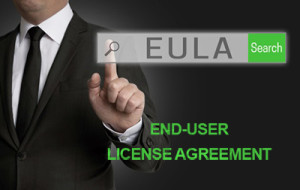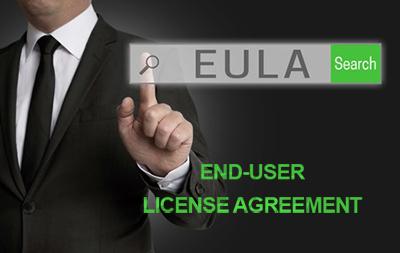 The terms and conditions of the license you provide a user of your software will vary based on many factors. For example, your end user license agreement (EULA) might be for commercial software intended for business use. Or it might be for a consumer software application.
The terms and conditions of the license you provide a user of your software will vary based on many factors. For example, your end user license agreement (EULA) might be for commercial software intended for business use. Or it might be for a consumer software application.
However, there are important parts that should be covered in every EULA in order to protect you when selling or giving away your software. Here are seven key issues your agreement should address.
1. Type of License. What kind of license are you granting the end user? Is it perpetual or revocable? If revocable, how can the license be ended and what conditions trigger termination? Can it be transferred to another user? If so, how?
Related Article – Software Lawyer: How One Can Help Your Business
2. Restrictions. What type of limitations on software use will you impose on the user? Is it permissible to reverse engineer your software? Are derivative works allowed?
3. Compensation. Are you being paid for the software license? If so, how much?
4. Intellectual Property Ownership. Who owns the IP for your software? Are parts of the code open source? If a user is allowed to create a derivative work, who owns the copyright for that work?
5. Software Updates. Are updates included in the license? If so, are they for a fixed term (e.g. one year after initial purchase) or perpetual (lifetime updates)?
6. Dispute Resolution. How do you want disputes handled if the user violates the license? Lawsuits? Mediation? Arbitration? What about governing law? And where will the disputes be resolved?
7. Warranty Disclaimers and Limitations on Liability. To reduce the likelihood of a dispute that ends up in court, you’ll want to disclaim certain warranties (e.g. warranty of merchantability). Generally, the shorter the period of time that any limited warranties apply, the better. You can also limit the amount of damages a user can seek from you (e.g. bar punitive damages).
Of course, there are other important parts of a software end user license agreement. These are simply seven of most common issues to address.
If you need an end user license agreement, or want an existing EULA reviewed to ensure you’re adequately protected, you should retain an experienced software attorney. If you’d like to discuss your legal needs with Software Lawyer Mike Young, just schedule a phone consultation at a day and time that’s convenient for you.

